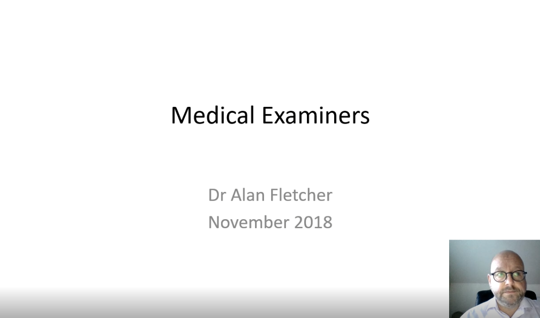The role of medical examiners
What do medical examiners do?
Medical examiners are senior medical doctors, who are trained in the legal and clinical elements of death certification processes. Their role includes:
- speaking to the doctor who treated the patient on their final illness
- reviewing the medical records and any supporting diagnostic information
- agreeing the proposed cause of death and the overall accuracy of the medical certificate cause of death
- discussing the cause of death with the next of kin/informant and establishing if they have any concerns with care that could have impacted/led to death
- acting as a medical advice resource for the local coroner
- informing clinical governance systems to highlight deceased patients who require a mortality case record review so any formal learning can be gained by the provider organisation
- ensuring that patterns and concerns about care
- are raised appropriately
- enabling a medical examiner officer to conduct component parts of the role under delegated authority.
To explain more about the role of medical examiners, Dr Alan Fletcher, National Medical Examiner, has provided the following video resources.
For more information about the role of medical examiners, download the model job description, which has been produced and approved by the Department of Health and Social Care.
The independence of medical examiners
A medical examiner must always be independent of the case and cannot know, or have treated, the deceased patient on which they are carrying out scrutiny of the circumstances of death.
They are responsible for completing the following steps to arrive at their decision:
- a proportionate review of medical records
- interaction with the attending doctor
- interaction with the bereaved.
The above should be completed within 24 hours of the medical notes being received (for cases not investigated by the Coroner). The interaction with the attending doctor and the bereaved may be undertaken in collaboration with medical examiner officers.
How independent will medical examiners be if they are employed by the NHS?
In England, medical examiners are employed by NHS trusts and have a separate reporting line to the Regional Lead Medical Examiner. Those who work in medical roles within the NHS are accustomed to having different roles and different lines of accountability and to making this work, and it is expected that employing organisations will respect this distinction. Appraisal and revalidation processes will support independence. Engagement with senior coroners is encouraged at the outset and specifically to support appointment committees. In Wales, medical examiners are employed by the NHS Wales Shared Services Partnership, supporting their independence.

